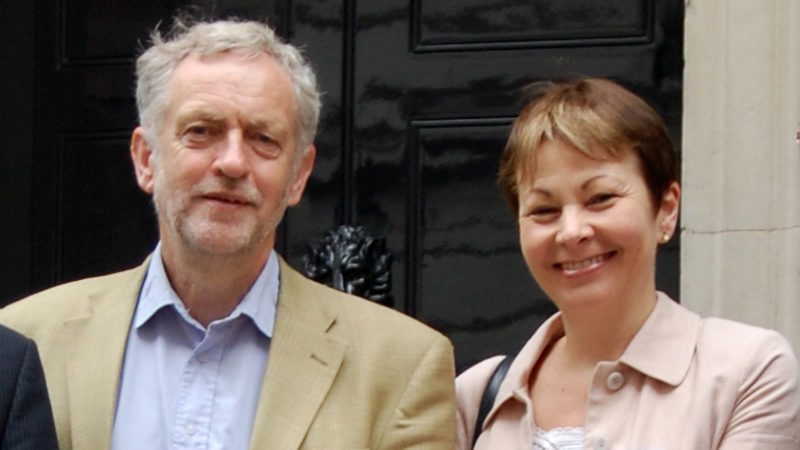Green support for the idea of a 'progressive alliance' at the last election was just a signal to vote Labour, argues Rupert Read.

Until recently, I was a big supporter of the ‘progressive alliance’ idea as a strategy for the Green Party.
I’ve written positively the potential of such an alliance on more than one occasion on this blog in the past. But I’ve fallen out with the idea.
Seeing Labour take hundreds of thousands of Green votes – while showing nothing but contempt for the notion of a progressive alliance (with Jeremy Corbyn ruling it out) – has brought it home to me that it was a false hope.
I want here to emphasise two reasons why the ‘progressive alliance’ concept is now useless and indeed dangerous for Greens:
1. Ever since the progressive alliance rhetoric became mainstream, Greens’ adherence to this political position essentially gives people a signal to vote Labour, not Green.
The Green Party, of course, has many ‘leftwing’ policies, and rightly so. For example, we have the strongest policies of any Party in this country on redistribution of wealth. However, for the Greens other political spectra are far more important than the vague, outdated, still-unfortunately-hegemonic Left vs Right spectrum.
If we accept an equation of Green with leftism, then we are sidelining the absolute centrality of ecology, and accepting the debate on Labour’s terms, on ‘Corbynite’ terms. This is catastrophic for the party.
It’s what happened at the general election, across virtually the whole country. Voters felt that Greens were giving them permission to vote Labour in droves.
Greens must make clear to people that we are not mainly a ‘Left’ party: we are the one and only post-growth, pro-ecology, anti-nuke, pro-democracy (starting with proportional representation) party…
2. The idea of a ‘progressive alliance’ is dead in the water. Given our party’s results, we have no possibility of being a major player in any such alliance.
After the election, the Greens now have no constituency second places. None (in any seat where the major parties stand). That means that a progressive alliance cannot work electorally, for us. If we were to go in for it again, we would be simply engaging in a complete act of destructive self-sacrifice.
For we would then be allowing a situation in which there would be calls for us to stand aside everywhere (save for Brighton Pavillion, which now looks safe next time, even without a progressive alliance, and even given boundary changes). That’s not an electoral strategy.
We need instead to find a way forward that works for the Green Party, and thus that serves the interests and beliefs of our voters, as well as of those (future people, non-human animals) who are depending upon us to succeed.
For the Green Party, it is time to put aside the notion that Labour has any interest in transcending tribalism, or in real democracy. It is back to the hard slog of trying to get elected, by ourselves. The only way we ever actually succeeded, in the first place…
Rupert Read is an academic at UEA. He tweets here.
This piece is part of a conversation about the role of the Greens, a month after the election. Agree/disagree with this piece? Email [email protected]
Left Foot Forward doesn't have the backing of big business or billionaires. We rely on the kind and generous support of ordinary people like you.
You can support hard-hitting journalism that holds the right to account, provides a forum for debate among progressives, and covers the stories the rest of the media ignore. Donate today.




8 Responses to “The idea of a progressive alliance is dead. The Greens need a new strategy”
Blade Runner
The Greens were the alternative vote in the 2015 general election, but now Corbyn has taken that vote. I agree with John Woods that they should save their money as it’s very hard to battle against the Past The Post system we currently have. Instead the money could be concentrated on 2 or 3 areas where the Greens will definitely will. Try and win seats very slowly.
As for a Progressive Alliance…What happened to the South West Surrey action to get Jeremy Hunt out of office? It didn’t happen. It didn’t work. Nobody worked together as he still got in!
Bev Maltby
I strongly agree with Rupert’s comments. I have always feared that characterising the Green Party as a ‘left wing’ party would damage it. Green politics lies outside the outdated left/right spectrum and should appeal to voters from all parts and outside of that spectrum. It was such a pleasure to campaign for Robert Lindsay in the Suffolk county council election – to be on the winning team was a new and exciting experience! I doubt that most of his voters in rural Suffolk would have been interested in voting for a candidate that they viewed as socialist.
John
The Greens need to articulate a clear and distinctive voice which was certainly mutes by the blather about a progressive alliance which was neither progressive nor an alliance. At best it was wishful thinking at worst it was stupidly naive. Green ideas are progressive ideas and the Green Party is best placed to promote them locally, nationally and internationally. Corbyn has enabled the Labour Party to find its social democratic values but these values albeit infinitely better than Blairiite New Labour and the reactionary Tories are historically quite modest, hardly radical or even left wing. The Greens are and unless they fall into the trap of campaigning only on environmental issues because ‘ecologism’ trumps the Left-Right group think they still have the potential of making a significant impact on British politics. To campaign primarily on environmental issues will encourage voters to put them in an ecological niche better inhabited by green pressure groups.